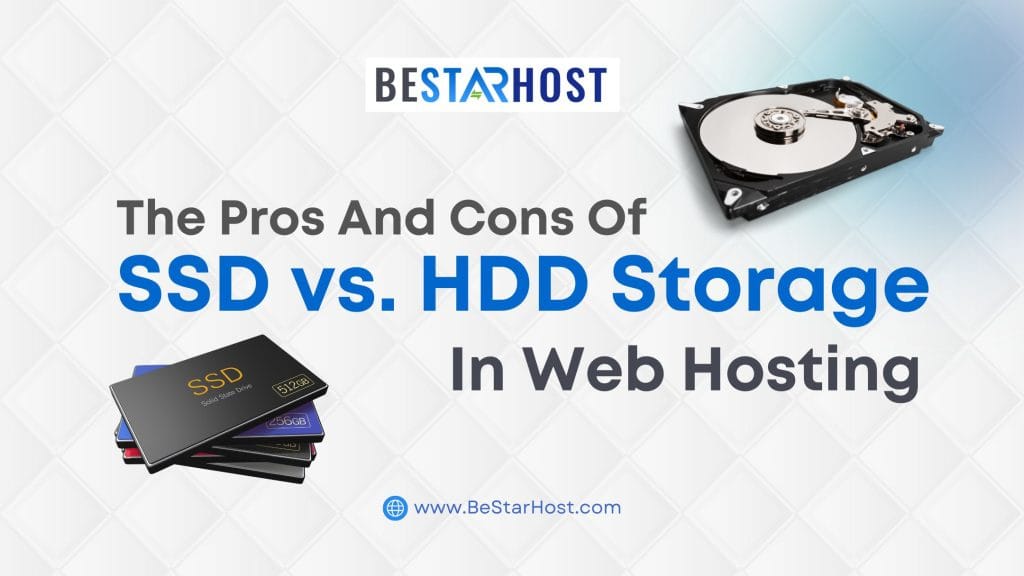
When choosing the right web hosting solution, storage technology plays a critical role in website performance, reliability, and overall efficiency. The debate between SSD vs. HDD for web hosting is ongoing, with each offering distinct advantages and drawbacks. This guide will explore the benefits of SSD hosting, the role of HDD storage for websites, and an SSD vs. HDD speed comparison to help you make an informed decision.
Understanding SSD and HDD Storage
What is HDD Storage?
A Hard Disk Drive (HDD) is a traditional storage device that uses spinning magnetic platters to read and write data. Since HDDs rely on moving mechanical parts, they are generally slower than modern Solid-State Drives (SSDs). However, they have been widely used for decades in web hosting due to their affordability and high storage capacity.
What is SSD Storage?
A Solid-State Drive (SSD) is a modern storage solution that uses flash memory to store data. Unlike HDDs, SSDs have no moving parts, which results in faster read/write speeds and improved durability. As a result, SSDs are becoming the preferred choice for web hosting providers aiming to offer superior website performance.
SSD vs. HDD Speed Comparison
Speed is one of the most significant factors when comparing SSD hosting performance to traditional HDD storage for websites.
- HDD Speed: HDDs typically offer read/write speeds between 80-160 MB/s due to their mechanical components.
- SSD Speed: SSDs can achieve speeds of 200-550 MB/s, significantly improving website loading times and data retrieval speeds.
Verdict: SSDs are significantly faster than HDDs, making them a better choice for websites requiring high-speed performance.
Benefits of SSD Hosting
Switching to SSD hosting offers several advantages:
1. Enhanced Website Performance
- SSDs reduce page load times, which improves user experience and boosts SEO rankings.
- Faster data access enhances dynamic website elements such as e-commerce stores and CMS platforms.
2. Improved Reliability and Durability
- SSDs have a lower failure rate due to the absence of moving parts.
- They can withstand shocks, vibrations, and temperature fluctuations better than HDDs.
3. Energy Efficiency
- SSDs consume less power than HDDs, making them an eco-friendly option.
- They generate less heat, reducing cooling costs for web hosting providers.
4. Better Security and Data Integrity
- Faster data retrieval ensures quicker backups and recovery times.
- SSDs minimize the risk of mechanical failures, which can lead to data loss.
Drawbacks of SSD Hosting
Despite their advantages, SSDs have some downsides:
1. Higher Cost
- SSD hosting plans tend to be more expensive than HDD hosting.
- However, the cost has been decreasing as SSD technology becomes more mainstream.
2. Limited Storage Capacity
- SSDs offer less storage space per dollar compared to HDDs.
- High-volume data storage needs may still favor HDD solutions.
HDD Storage for Websites: Pros and Cons
Advantages of HDD Hosting:
- Cost-Effective
- HDDs are more affordable, making them ideal for budget-conscious users.
- High Storage Capacity
- HDDs offer higher storage capacities at lower costs, suitable for websites with extensive data storage needs.
Disadvantages of HDD Hosting:
- Slower Performance
- HDDs have lower read/write speeds, which can lead to slower website loading times.
- Higher Failure Rates
- Due to mechanical components, HDDs are more prone to physical damage and wear over time.
- Increased Power Consumption
- HDDs require more power and cooling, making them less energy-efficient compared to SSDs.
Choosing the Right Storage Option for Web Hosting
The choice between SSD vs. HDD for web hosting depends on your specific needs:
- Choose SSD Hosting If:
- You need fast website performance.
- You run an e-commerce website or a high-traffic blog.
- You prioritize website security and reliability.
- Choose HDD Hosting If:
- You require high storage capacity at an affordable price.
- You are hosting a personal blog or low-traffic website.
- Your website doesn’t require fast data retrieval.
Conclusion: SSD vs. HDD – Which is Best for Web Hosting?
Both SSD hosting and HDD hosting have their own strengths and weaknesses. If you prioritize speed, reliability, and efficiency, then SSD hosting performance is the superior choice. However, if your main concern is affordability and storage capacity, HDD storage for websites remains a viable option.
For the best balance of performance, reliability, and cost, BeStarHost offers SSD hosting plans that cater to various needs. Whether you’re running a personal blog, an online store, or a corporate website, investing in SSD hosting can significantly enhance your website’s performance and user experience.
